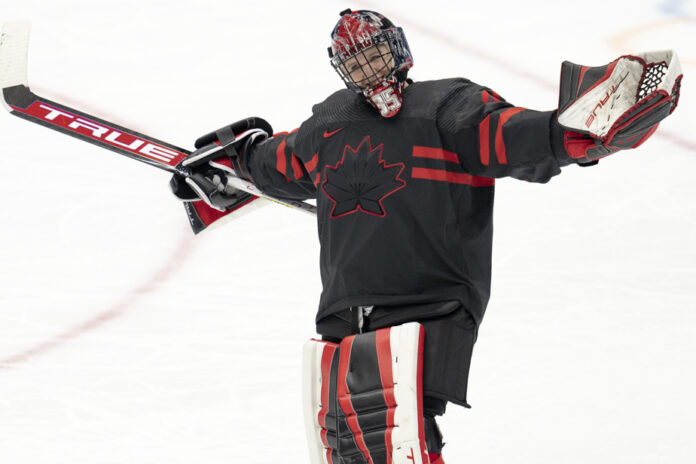Canada wants to diversify its arsenal at the World Women’s Hockey Championship.
The Canadians relied on their explosive attack to win Olympic gold, before climbing to the top step of the podium at the Women’s Worlds with a little less edge in attack and a little more arm oil in 2022.
The Maple Leaf representatives will be chasing a third consecutive world title starting Wednesday, when they face Switzerland in Brampton, Ont.
Head coach Troy Ryan therefore challenged his flock to find a certain balance between a devastating attack and an irreproachable work ethic at the CAA Centre.
Canada won the 2022 Women’s Worlds in Herning, Denmark, less than seven months after breaking the Olympic tournament record with 57 goals in Beijing, China.
During the seven-game Rivalry Series against the United States, which the Canadians won 4-3, Ryan asked his players to think about a hybrid style of play bringing together those who made their successes last year.
“We relied heavily on offense at the Olympics. In Denmark, the United States were the most offensive team, the most spectacular, whereas we were more betting on our fighting spirit,” Ryan told La Presse Canadienne.
“How about we merge these two styles?” I do not believe that we should concede attack in order to be more tight in defense, and more tough.
“We started applying this philosophy during the Rivalry Series. Admittedly, it is still a project in development, but it is an exciting one. I’m sure this group believes in this concept of merging those two styles of play.”
The COVID-19 pandemic forced the postponement of the 2021 World Championship until the end of the summer, and the International Ice Hockey Federation added a Hockey World Cup to an Olympic year. As a result, for the first time, the Canadians will be chasing a fourth consecutive gold medal in a major international competition in less than 20 months.
Canada won gold at the Women’s Worlds in Calgary in 2021, ending the United States’ hegemony for five consecutive Women’s Worlds.
After their opener against Switzerland, the Canadians will face the Czech Republic on Friday and Japan on Saturday. Canada will complete the preliminary phase with a clash against the Americans on April 10.
Finland, Sweden, Hungary, Germany and France make up Group B.
The quarter-finals will take place on April 13, followed by the semi-finals on the 15th, as well as the small and grand finals on the 16th.
Canada’s roster includes 18 players who have triumphed at the 2022 Olympics and World Championships, including Quebec goaltender Ann-Renée Desbiens and teammates Emerance Maschmeyer and Kristen Campbell.
Unsurprisingly, the Beauceronne Marie-Philip Poulin, voted female athlete par excellence by La Presse Canadienne in 2022, will be the captain of the training. She also became only the fifth player in history to reach 200 career points during the Rivalry Series against the United States.
Poulin, Brianne Jenner, Sarah Nurse and Sarah Fillier should lead the Canadian attack.
Forward Natalie Spooner will return to action after giving birth to a child in December.
Rebecca Johnston will also return to Team Canada, after taking time out from the Beijing Olympics to give her back some rest.
Claire Thompson, who was named the most outstanding defender of the last Olympic tournament, missed the Women’s World Cup in Denmark to begin her medical studies at New York University.
She will be back in the Canadian roster, which will add another dimension to the Canadian offense.
“We have a lot of young defenders…who are playing well enough to be here and have an impact on our team, although some of them still haven’t reached their full potential,” Ryan noted.
“At the beginning of an Olympic cycle, we have to find them playing time. We have to offer them opportunities to play, if possible. It’s not always possible, and it’s obviously not always possible to do that for all of them,” he added.
Ryan, from Spryfield, Nova Scotia, is under contract with the team until the Olympics in Cortina, Italy, in 2026. He therefore has free rein with his training, and his players give him back.
“He allows us to have fun on the rink, which drives us to push ourselves and want to give him more,” Spooner explained.
“With Troy, we always feel like we’re up for a challenge. If you make a mistake, it usually happens in its game structure, even though it’s generally flexible and permissive,” she added.
“I’m thinking of the Olympics. We were so, so prepared. No matter what happened on the rink, we knew we were going to come out on top. »















